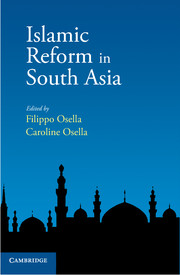Book contents
- Frontmatter
- Contents
- List of Contributors
- Introduction
- Part I Reformist Journeys
- Part II Debating Reform
- Part III Everyday Politics of Reform
- Part IV Reform, State and Market
- 15 Cosmopolitan Islam in a Diasporic Space: Foreign Resident Muslim Women's Halaqa in the Arabian Peninsula
- 16 Jamaat-i-Islami in Bangladesh: Women, Democracy and the Transformation of Islamist Politics
- 17 Secularism Beyond the State: The ‘State’ and the ‘Market’ in Islamist Imagination
- Index
17 - Secularism Beyond the State: The ‘State’ and the ‘Market’ in Islamist Imagination
from Part IV - Reform, State and Market
Published online by Cambridge University Press: 05 January 2014
- Frontmatter
- Contents
- List of Contributors
- Introduction
- Part I Reformist Journeys
- Part II Debating Reform
- Part III Everyday Politics of Reform
- Part IV Reform, State and Market
- 15 Cosmopolitan Islam in a Diasporic Space: Foreign Resident Muslim Women's Halaqa in the Arabian Peninsula
- 16 Jamaat-i-Islami in Bangladesh: Women, Democracy and the Transformation of Islamist Politics
- 17 Secularism Beyond the State: The ‘State’ and the ‘Market’ in Islamist Imagination
- Index
Summary
I am proposing only that we should abandon the state as a material object of study… while continuing to take the idea of the state extremely seriously.
(Abrams 1988: 75)Islamists are defined as those among Muslim revivalists who focus on taking over the state—they certainly seem to take the state, both as an idea and as a material object, very seriously (see, for instance, Fuller 2003). However, even as taking over the state remains the proclaimed aim-prompting, in response, an alarmist discourse about the imminent dangers of an Islamist coup, actual strategies pursued over the last two decades have involved a subtle move away from the state as the locus for mobilizations. It is argued here that in rough alignment with the shift in global political imagination where the state is no longer the dominant mobilizer of political energies and projects, Islamist strategies belie a move towards using the market as an alternative engine for defining and facilitating moral and political change. This shift does not imply a complete break with the past and certainly at the rhetorical level the focus on the state continues. However, as shown below, increasingly marginalizing Maududi's vision of the state as the central agent of change in the modern world, contemporary Jamaat-e-Islami activists are grappling with the many contradictions in their relationship with the market as an engine for the formation and transformation of the moral community. Moreover, the idea of the market remains infused with conflicting sentiments.
- Type
- Chapter
- Information
- Islamic Reform in South Asia , pp. 472 - 503Publisher: Cambridge University PressPrint publication year: 2013
- 1
- Cited by

